| کد مقاله | کد نشریه | سال انتشار | مقاله انگلیسی | نسخه تمام متن |
|---|---|---|---|---|
| 2780462 | 1153299 | 2011 | 10 صفحه PDF | دانلود رایگان |

Breast cancer metastasizes to bone where it stimulates formation of bone-resorbing osteoclasts. Bisphosphonates constitute an important treatment for osteolytic metastases. The goal of this study was to assess the effects of soluble factors produced by breast cancer cells on osteoclast survival and responsiveness to bisphosphonates. Osteoclasts derived from the murine monocytic cell line RAW264.7 or from primary mouse bone marrow were cultured for 24–48 h untreated, with 10% conditioned media (CM) from human (MDA-MB-231) or mouse (4T1) metastatic breast carcinoma cells, or with a pro-survival factor RANKL. Cancer-derived factors maintained osteoclast survival at the levels comparable to those observed with RANKL. Alendronate (10−4 M) or pamidronate (10−7 M) induced osteoclast apoptosis in untreated and, to a smaller extent, in RANKL-treated cultures, resulting in a significant decrease in osteoclast number and size, induction of caspase-3 cleavage and up-regulation of BIM. In the presence of cancer-derived factors, bisphosphonates were ineffective in inducing osteoclast apoptosis, resulting in only modest decrease in osteoclast numbers and not in size. MDA-MB-231 CM prevented bisphosphonate-induced cleavage of caspase-3 and up-regulation of BIM. MCSF-neutralizing antibody attenuated the effect of MDA-MB-231 CM by ~ 50%, but could not fully restore osteoclast responsiveness to alendronate. Inhibition of phospholipase C (PLC)-γ interfered with MDA-MB-231-induced down-regulation of BIM and prevented anti-apoptotic action of cancer-derived factors on osteoclasts. Our data suggest that factors produced by the metastatic breast cancer cells promote osteoclast survival and block the apoptotic effect of bisphosphonates in MCSF and PLC-dependent manner, potentially compromising bisphosphonate effectiveness in the bone metastasis setting.
Journal: Bone - Volume 48, Issue 2, 1 February 2011, Pages 202–211